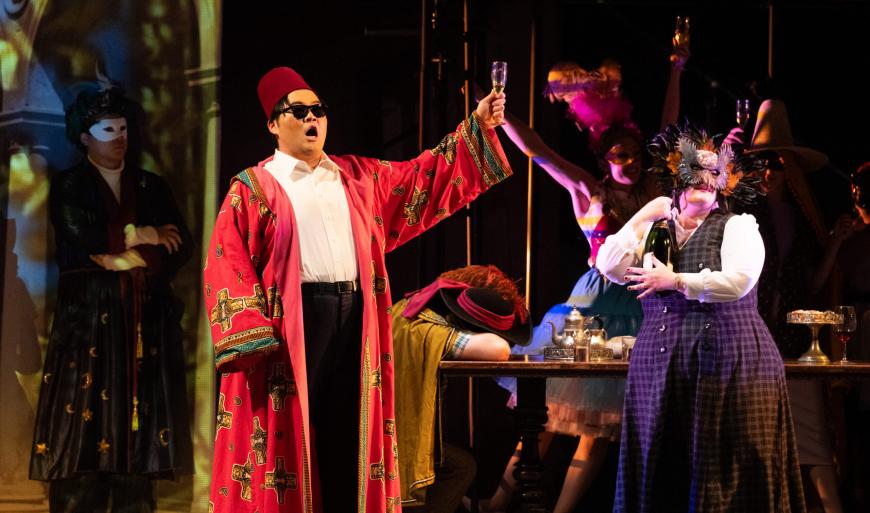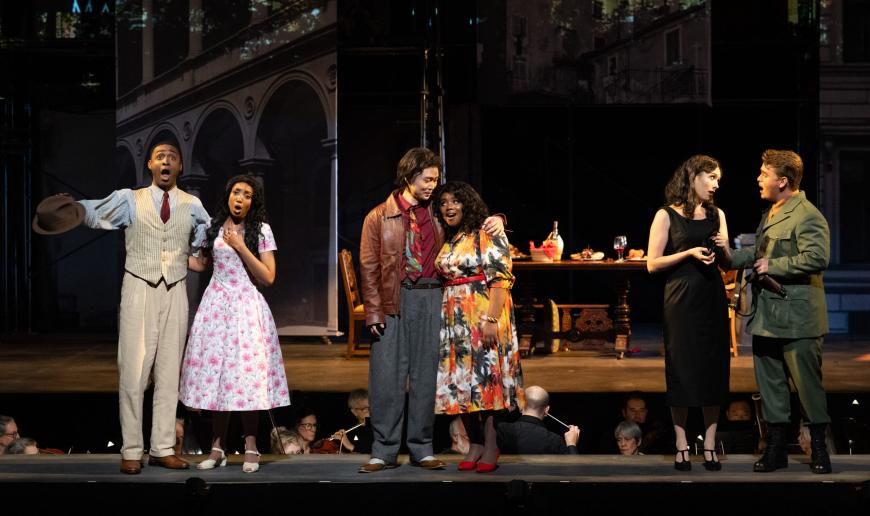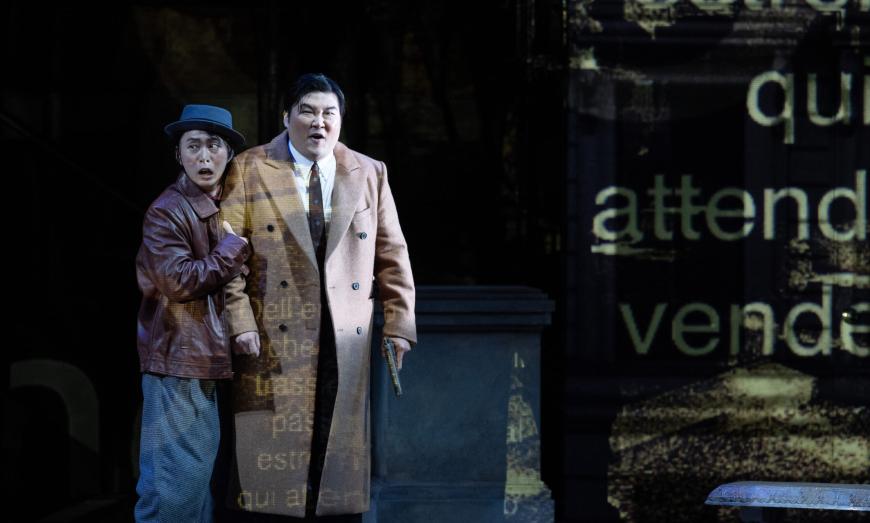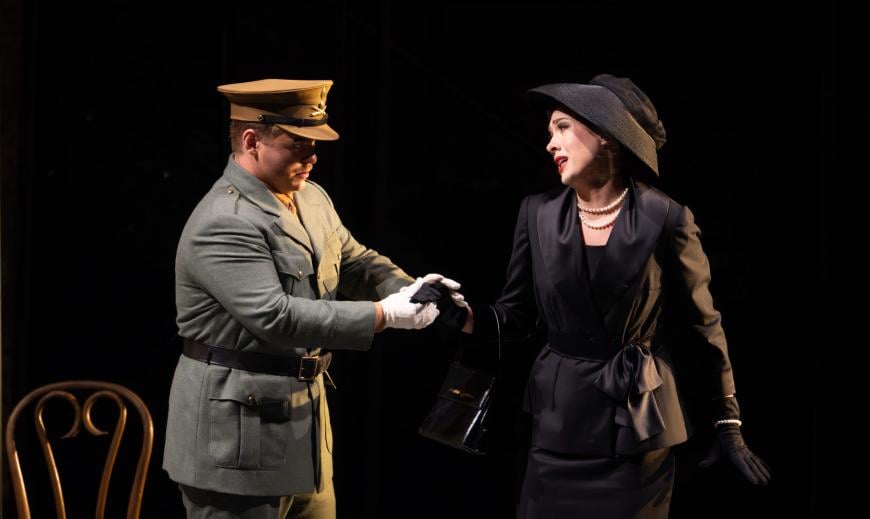
Staging Mozart’s Don Giovanni well is a challenge for any director. A central concept can fail through outlandishness or because the director doesn’t take the concept far enough. A staging can be overly jokey, masking the title character’s darkness. Without focus, there’s the risk that what the audience sees is a parade of great arias with no dramatic cohesion.
Throughout her career, soprano Patricia Racette has been a superb actor and singer, and judging by the triumph of the Merola Opera Program’s Don Giovanni, seen at the San Francisco Conservatory of Music (SFCM) on Aug. 1, she’s also a splendid and insightful director. Put her direction together with an extraordinary cast of young singers and the first-class conducting of Stefano Sarzani, and you’ve got a tremendous production.
Racette, herself a former Merolina and Adler Fellow, set the opera sometime in the mid-20th century, at least going off designer Annie Smart’s costumes. In Racette’s staging, the action was clearly motivated by the words and plot, and that action was highly detailed and specific without ever being fussy or unnatural.

The singers all had the kind of physical expressivity and individuality that convinces you that you’re watching real people with real emotions. Each performer listened to and reacted to the others, regardless of whether they were singing. There was not a false or unmotivated moment in the entire three-hour opera.
Racette also kept the action moving swiftly, helped by the comparatively small number of props and especially by Andrew Boyce’s clever set design. The two-level set appeared to be made of panels on which huge architectural photos were projected, with a number of openings and a door used for quick entrances and exits. The set allowed exceptionally smooth and integrated transitions from scene to scene, aiding the opera’s dramatic continuity.
At the center of this production was the South Korean baritone Hyungjin Son, singing Don Giovanni with a beautiful and well-controlled voice. Son is tall, handsome, and charismatic, and he was seductive, dangerous, and casually abusive as the role demanded. You could definitely understand how this smooth and attractive Don has seduced more than 2,000 women –– but you wouldn’t want to cross this man who is nearly gleeful as he stabs the Commendatore to death.

Bass-baritone Donghoon Kang, also from South Korea, was Don Giovanni’s servant and foil, Leporello. Like Son, Kang sings gorgeously; he was funny and charmingly sheepish and did a terrific job imitating Son in voice and bearing for the scene when they switch clothing and Leporello tries to seduce Donna Elvira.
The excellence of the singing extended to everyone in the cast. I’ve rarely heard a more consistently formidable group of singers, and it’s that much more impressive given that the Merolini are early in their careers. They have the musical, dramatic, and vocal maturity of far more experienced singers.
To the role of Donna Anna, Lydia Grindatto brought a very large, dark soprano and dignified bearing. Seeing her father dead, she fainted into the arms of her Don Ottavio, tenor Michael John Butler. Butler was an unusual Ottavio, with a tenor so big and burly that it’s hard to imagine him staying in roles that are usually sung by lighter lyric tenors. Regardless, his performance of the aria “Dalla sua pace” (Upon her peace of mind) had the right amount of lift and float. His military posture –– he wore a green uniform for most of the evening –– and sound gave him a more masculine air than many Ottavios. The character’s florid aria “Il mio tesoro” (My treasure) was cut here, which added to the dramatic cohesion and fleetness of the performance.

The bright-voiced soprano Viviana Aurelia Goodwin sang Donna Elvira brilliantly, handling the difficult runs in “Mì tradi quell’alma ingrata” (The ungrateful soul betrayed me) with aplomb. She was a less obsessed, more dignified Elvira, a tribute to her own style and Racette’s direction. Soprano Moriah Berry was a pert, adorable Zerlina, vulnerable to Don Giovanni’s enticements, terrified when he drags her offstage, contrite to her new husband Masetto. Bass-baritone Justice Yates was a sincere, warm Masetto, acting the part with loose-limbed grace. Bass-baritone Benjamin R. Sokol was a bit on the grainy side in the brief role of Donna Anna’s father, the Commendatore, and wasn’t helped by being amplified during the closing scene, when the Commendatore comes to dinner and drags Don Giovanni off to hell.
The Caroline H. Hume Concert Hall at SFCM doesn’t have a pit, and consequently the small orchestra was seated in front of the stage, which was built out to wrap around the musicians. Sarzani conducted a stylish, propulsive performance that never sounded driven. Slow arias floated; faster arias had rhythmic snap and pulse. The San Francisco Opera Center Orchestra sounded splendid in an arrangement by Bryan Higgins.




